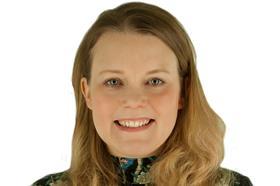Nine years ago, I catapulted into my legal career fresh out of university.

I was an eager paralegal, keen to make my mark in an area of law I have always been incredibly passionate about and in which I still practice.
Although we had the Equality Act, I didn’t identify as a disabled lawyer. I also didn’t know any. I looked around and I didn’t see anybody like me. No one asking for reasonable adjustments. No one asking if I needed any.
My disability isn’t visible, so although I was open about having an illness, I rarely spoke about how it truly affected me. I never asked for help. I didn’t want to give anyone cause to write me off before I started.
As a trainee, and later as a qualified solicitor, I continued to work full time. I became more open about my illness. I was given unlimited health concessions for medical appointments which I didn’t have to work back. The number of sick days I needed each year because of my illness weren’t taken into account against my absence record. If I was feeling particularly unwell, I could ask to work from home. But I was never off sick. And I rarely asked to work from home.
The problem has never been what was on offer. Fortunately, I have never had any of my requests refused. That is, if I had the confidence to ask.
And therein lies the problem: the culture of presenteeism. It has always been ingrained in me that the longer you are seen at your desk, the more committed you are perceived to be, the more respect you earn and the more likely you are to be promoted. Being busy and over-burdened is worn as badge of honour.
Having always been very career driven, my work and my health have always required a delicate balancing act. Towards the end of 2019, after some years of allowing my career to tip the balance, I became very unwell and required life changing (and saving) surgery. I needed four months off work to recover and this came with a major mindset shift.
My health had finally tipped the balance, this time for good.
Since those dark days, I have proudly identified as a disabled lawyer. Why?
Because I made a promise to myself that I would always put my health first. Because I needed reasonable adjustments to keep that promise. Because being a disabled lawyer does not make me any less of one.
In fact, I have more to give than before, when I was often running on empty. I can manage my illness in a way that suits me best. That is, on reduced hours, flexibly and from home.
Disability inclusion is quickly rising to the top of the agenda in Wales thanks to the Legally Disabled? research project by Dr Natasha Hirst and Professor Deborah Foster at Cardiff University. Their research has showed that more than 90% of lawyers surveyed have invisible impairments that may not be known to employers or colleagues, unless individuals choose to disclose it.
This is why we must do more to encourage disabled lawyers to speak out, whether their disability is visible or not. Being transparent about my disability and my needs meant that I was not 'dis-abled' at all. Instead, I was armed with the tools I needed to become more able than ever.
What would I like to see moving forward? I would like to see law firms reserving training contracts for disabled lawyers. Trainee solicitors will become solicitors. Solicitors will become partners. And there you will have diversity and inclusion from the bottom up.
I would like to see disability and inclusion groups within law firms and local law societies. Access to diversity and inclusion networks should be available to everyone.
I would like to see more research within the legal profession to identify issues surrounding promotion, retention and seniority. We must keep building momentum to better understand what needs to be done to improve disability inclusion in our profession.
I would like to see law firms responding to the call to action brought along by a global pandemic. We have proved that people can work productively from home long-term and disabled lawyers desperately need the profession to break away from the traditional ways of working to which it has been wedded for too long.
Last but not least, I would like to see law firms championing their disabled lawyers for what they bring to the table.
A disabled lawyer’s resilience might be what enables them calmly to weather the storm. A disabled lawyer’s experience of living in a society designed without their disability in mind might be what enables them to offer unique ideas and solutions that others cannot see.
Roughly 1 in 5 working adults have some form of disability. Why wouldn’t we want our law firms to reflect the diversity of society? With diversity comes creativity and innovation.
We may even find that the adjustments we make for disabled lawyers make the workplace a better place for everybody.
Rhian Smith is an associate solicitor at JCP Solicitors and chair of the Disability Subcommittee of Cardiff Law Society































No comments yet